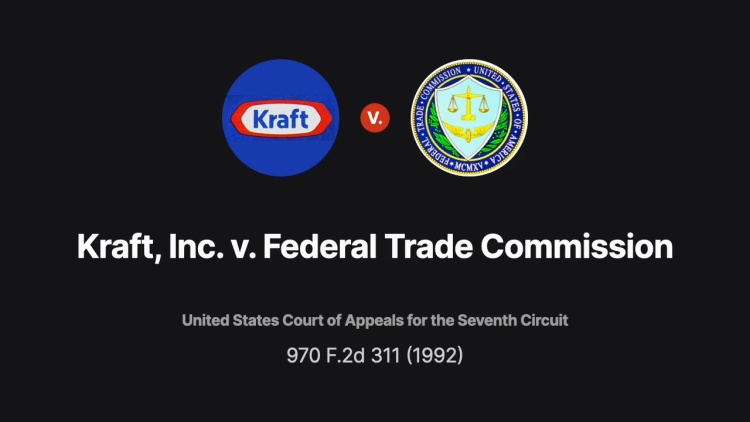Kraft, Inc. v. Federal Trade Commission
United States Court of Appeals for the Seventh Circuit
970 F.2d 311 (1992)
- Written by Sheri Dennis, JD
Facts
Kraft, Inc. (Kraft) (plaintiff) was the manufacturer of Kraft Singles processed cheese (Singles). Singles were categorized as dairy slices and by law were required to contain at least 51 percent natural cheese. Singles were distinguishable from imitation-cheese slices, which contained little or no natural cheese. In the 1980s, the number of imitation-cheese slices advertised as being equally nutritious to dairy slices but less expensive increased in the market. This caused the sales of Singles to decrease. In response, Kraft commenced an advertising campaign aimed at informing consumers that Singles were superior to imitation-cheese slices because Singles were made from five ounces of milk and therefore had a higher calcium content than imitation-cheese slices. However, although Singles were made from five ounces of milk, 30 percent of the calcium contained in the milk was lost when the milk was processed to cheese. Thus, Singles did not contain the calcium content of five ounces of milk. Additionally, Singles did not contain more calcium than most imitation-cheese slices. After investigating the matter, the Federal Trade Commission (FTC) (defendant) determined that Kraft was misrepresenting the calcium content of Singles and as a result was engaging in unfair and deceptive practices in violation of the Federal Trade Commission Act (Act), 15 U.S.C. § 45. Specifically, the FTC determined that Kraft was wrongfully inducing consumers to purchase Singles by using advertisements that were materially misleading, as prohibited by 15 U.S.C. §§ 52 and 55. The FTC ordered Kraft to cease and desist making these misrepresentations. Kraft petitioned for review of the FTC’s cease-and-desist order.
Rule of Law
Issue
Holding and Reasoning (Flaum, J.)
What to do next…
Here's why 907,000 law students have relied on our case briefs:
- Written by law professors and practitioners, not other law students. 47,100 briefs, keyed to 996 casebooks. Top-notch customer support.
- The right amount of information, includes the facts, issues, rule of law, holding and reasoning, and any concurrences and dissents.
- Access in your classes, works on your mobile and tablet. Massive library of related video lessons and high quality multiple-choice questions.
- Easy to use, uniform format for every case brief. Written in plain English, not in legalese. Our briefs summarize and simplify; they don’t just repeat the court’s language.





